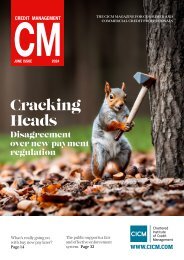CM September 2020
The CICM magazine for consumer and commercial credit professionals
The CICM magazine for consumer and commercial credit professionals
You also want an ePaper? Increase the reach of your titles
YUMPU automatically turns print PDFs into web optimized ePapers that Google loves.
NEW<br />
FEATURE<br />
TECHNICALLY SPEAKING<br />
PHONEY WAR<br />
Insight and comment from the CI<strong>CM</strong> Technical Committee<br />
AUTHOR – Sean Feast FCI<strong>CM</strong><br />
THE full impact of COVID-19<br />
on both the consumer and<br />
commercial debt collection<br />
industry is yet to be felt, and<br />
no-one can predict with any certainty<br />
what happens next. But even if half of<br />
the guesswork proves to be true, many<br />
hundreds of thousands of consumers<br />
will be plunged into debt by the end of<br />
the year, and a not dissimilar number of<br />
businesses may also go to the wall.<br />
Experts within the CI<strong>CM</strong>’s Technical<br />
Committee met virtually in July to<br />
report on and share their knowledge and<br />
insight of various Bills, consultations,<br />
calls for evidence, and other such<br />
Government-led programmes that will<br />
have a direct or indirect impact on<br />
creditors and the credit community.<br />
Within the consumer debt space, a<br />
Phoney War was likely to lead to a very<br />
real battle for survival among a group<br />
of the most hard-pressed consumers.<br />
Committee members from the advice<br />
sector and collections industry said that<br />
high volumes of debt were currently<br />
being paid off, and that many consumers<br />
were clearly taking advantage of<br />
payment holidays (or monies that they<br />
might have spent during lockdown) on<br />
settling their debts.<br />
Within the advice sector especially,<br />
an initial surge in calls to the various<br />
support lines had quickly abated, and<br />
at least one reported that demand was<br />
currently running at about a third of its<br />
total capacity. Customers were actively<br />
seeking to pay off their debts, borrowing<br />
from friends and family if necessary to<br />
do so, perhaps in preparation for a long,<br />
hard winter that might follow along with<br />
the fear of losing their jobs.<br />
INSOL-<br />
PINCH POINTS<br />
This lull before the storm is not expected<br />
to last. Certain ‘pinch points’ – the end<br />
to the furlough scheme and a shift in<br />
attitudes to forbearance – could be<br />
the tipping points. The re-engagement<br />
of enforcement action on August 23<br />
was always going to arouse negative<br />
press and has done, and there were<br />
concerns over the lifting of rent arrears<br />
convictions and what this would mean to<br />
the total consumer debt picture.<br />
An interesting point was also made<br />
about the blurring of lines between<br />
‘consumer’ and ‘commercial’ debts,<br />
especially when it came to the owner/<br />
directors of small businesses who could<br />
find themselves falling between two<br />
stools in how they are dealt with.<br />
Whereas there was understandable<br />
debate about<br />
VENCY<br />
the impact of the current<br />
crisis on consumers, there were similar<br />
concerns expressed about the new<br />
Corporate Insolvency and Governance<br />
Bill (see Credit Management July/August<br />
<strong>2020</strong>) and how it was going to impact<br />
creditors.<br />
MORATORIUM CONCERNS<br />
Of particular concern is the moratorium<br />
and to what extent it may be open to<br />
abuse. The moratorium effectively allows<br />
an insolvent business a period of 20<br />
business days grace during which time<br />
creditors are not able to enforce any<br />
action to recover what’s owed. Worse<br />
than this, creditors cannot discontinue<br />
from supplying product/services to said<br />
failed/failing business if that product (or<br />
service) is considered ‘essential’ and if<br />
refusing to supply would jeopardise the<br />
potential rescue of the business in the<br />
insolvency process.<br />
The Technical Committee<br />
acknowledged that in continuing to<br />
supply an essential product, the creditor<br />
would, in theory, be given priority status<br />
for any future payments, but that the<br />
risk seemed disproportionate to the<br />
reward. Some could see a scenario where<br />
deliveries might mysteriously go astray<br />
or be indefinitely delayed. Others were<br />
concerned that the IPs themselves would<br />
have to do quite a bit of background<br />
TECHNICAL COMMITTEE MEMBERS<br />
Glen Bullivant FCI<strong>CM</strong> ..............................................Chair of CI<strong>CM</strong> Technical Committee<br />
Alan Brown MCI<strong>CM</strong> .................................................................................................formerly BP<br />
Amir Ali FCI<strong>CM</strong> .....................................................................................................................CCUA<br />
Julian Roberts ....................................................................................................................... HSBC<br />
Joanna Carnell MCI<strong>CM</strong>(Grad) .................................................................................Trust Ford<br />
Paula Swain ...............................................................................................................Shoosmiths<br />
Peter Whitmore FCI<strong>CM</strong> ....................................................................................Westcon Group<br />
Debbie Nolan FCI<strong>CM</strong>(Grad) ............................................................................................. Arvato<br />
Mike Sargeant MCI<strong>CM</strong> ...........................................................Retired, formerly Baker Tilly<br />
David Kerr FCI<strong>CM</strong> ............................................................................... Insolvency Consultant<br />
Matthew Davies ........................................................................................................ UK Finance<br />
Lauren Carter ......................................................................................................Vantage Credit<br />
Stephen Cowan FCI<strong>CM</strong> ......................................................................................... Yuille & Kyle<br />
Alistair Chisolm .............................................................................................................. Payplan<br />
Andrew Macdonald FCI<strong>CM</strong> ........................................................... formerly Matthew Clark<br />
David Thornley FCI<strong>CM</strong>(Grad) .....................................................FortVale Engineering Ltd<br />
Hans Meijer FCI<strong>CM</strong> ............................................................................................................Coface<br />
David Sheridan FCI<strong>CM</strong> .....................................................................................Arc Europe Ltd<br />
Pamela Mulcahy ...........................................................................................Marston Holdings<br />
Glyn Powell FCI<strong>CM</strong> ............................................................................The Best Start Club Ltd<br />
work in advance to assess whether a<br />
failing business could be saved or sold<br />
and would face undoubted criticism if<br />
they subsequently took an appointment<br />
having previously said that a recovery<br />
was possible.<br />
‘Creditor Beware’ appeared to be<br />
the watchword, along with advice to<br />
review current Terms and Conditions<br />
where appropriate to protect your<br />
future position, mindful, however, that<br />
circumstances change and T&Cs could<br />
become fast out of date.<br />
A report was received on the<br />
performance of the courts during the<br />
lockdown period, with the process being<br />
described as either ‘blisteringly quick<br />
or glacially slow’. A similar report was<br />
heard from the Banks who are concerned<br />
about future competition post-COVID<br />
with particular reference to alternative<br />
lenders and what happens when the<br />
various support schemes begin to<br />
unwind.<br />
Perhaps more alarming was a report<br />
on the future of Business Information<br />
and the unintended consequences of<br />
payment holidays, rental holidays, delays<br />
in filing company accounts etc and<br />
how they would impact future credit.<br />
The quality, integrity and credibility of<br />
business information going forward is<br />
going to be a severe challenge for the<br />
information providers with regards to<br />
what extent their information is current<br />
and reliable.<br />
Advancing the credit profession / www.cicm.com / <strong>September</strong> <strong>2020</strong> / PAGE 8


















